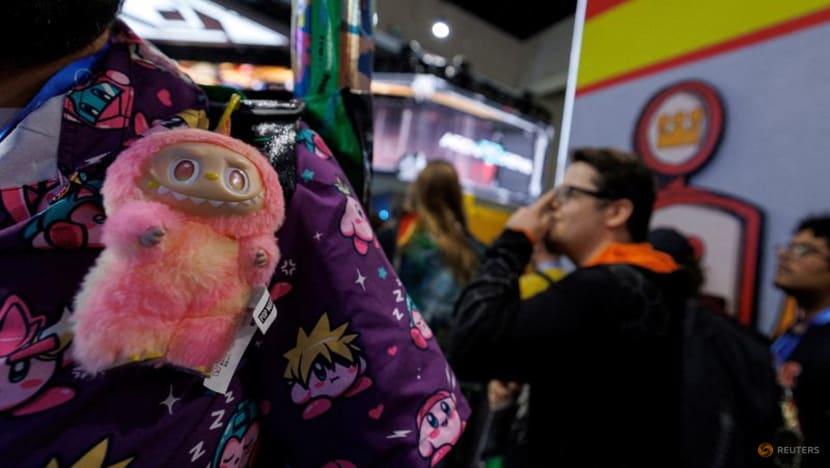Popular Chinese brands look to brew success in US despite tariff threats
Analysts say that while the conditions are ripe for such firms to enter the American market, US President Donald Trump’s tariffs might stand in the way.
.png?itok=FgBGicgo)
A composite photo of US stores of Chinese brands Luckin Coffee, Heytea, and Pop Mart.

This audio is generated by an AI tool.
NEW YORK: When Luckin Coffee opened its first two stores in New York City in June, it became the latest in a string of Chinese brands to set up shop on American soil.
The chain – founded in Beijing in 2017 – already has more than 26,000 stores worldwide, including in Singapore and Malaysia.
Known for its bestsellers like coconut latte and an app-based ordering system, it overtook Starbucks as China’s biggest coffee chain two years ago.
It is among popular Chinese companies that are betting big on American consumers, despite the ongoing trade war between China and the United States.
While analysts say the conditions are ripe for such firms to enter the US market, they warn that President Donald Trump’s tariffs might stand in the way.
STRONG SIGNS OF SUCCESS
Fellow Chinese beverage chain Heytea launched its first US store in late 2023, while Beijing-based toy retailer Pop Mart – which sells the wildly popular Labubu dolls – opened its first permanent store in the US that same year following the success of a pop-up store.
Both companies have shown strong signs of success in the American market, with Heytea now having 30 stores across the country. It is also reportedly the fastest-growing tea brand in the US at the moment.
Pop Mart is seeing astronomical growth as well, in part due to the popularity of Labubu dolls.
The company said its US revenue surged more than 500 per cent between 2023 and 2024, while sales in the first quarter of this year climbed 900 per cent compared to the same period last year. It now has 22 stores in the US.
Experts pointed to several reasons why these firms are choosing to launch in America, including the slowing down of China’s economy.
“The hyper amount of competition within its domestic economy is motivating many of its leading firms, especially those that are consumer based, to seek opportunities abroad,” said Arthur Dong, a professor at Georgetown University’s McDonough School of Business.
“The US happens to be a very, very large market, as well as a market that's open to new concepts and new ideas.”
Marketing professor Larry Chiagouris said many of these brands target younger customers who are more likely to be open to new brands and are attracted to low costs and price incentives – something Luckin is known for.
The chain launched an opening promotion where US customers could get their first drinks for US$1.99. Its cheapest menu item is drip coffee, priced at US$3.45.

“Younger consumers are more willing to try anything once or even twice. They also have more limited resources; they don't have the deep pockets that their parents and their grandparents have, so sometimes they’re forced to try these lower priced items,” said Chiagouris, who teaches at Pace University’s Lubin School of Business.
“I think (this is) the best way to work yourself into … a marketplace, through selling to younger consumers. And younger consumers often tend to establish trends, so it's a perfect marriage,” he added.
TARIFF ISSUES
Meanwhile, a record number of Chinese companies are seeking a US stock market listing this year. Thirty-six have already gone public in the US in the first half of 2025.
However, Trump’s tariff war could pose a threat to some of these firms looking to make waves in America, said experts.
Dong noted that firms dealing in goods and merchandise, such as Pop Mart which sells collectable toys and figurines, will confront tariff challenges that will vary depending on where their goods come from.
“All of them are going to be subject to blanket tariffs … But for service-based companies such as Heytea as well as Luckin Coffee, they're not going to be subject to tariffs. Unless, of course, they import products from China or from their home country of origin,” Dong added.
A week ago, Trump extended a trade truce with China by another 90 days. This prevented US tariffs on Chinese goods from shooting up to 145 per cent, while Chinese tariffs on US goods were set to hit 125 per cent.
For now, the truce has locked in place a 30 per cent tariff on Chinese imports, with Chinese duties on US imports at 10 per cent.
With the agreement set to expire in mid-November, both superpowers will look to come to a longer-term agreement – something many Chinese companies will be counting on as they aim to make the most of deep American pockets.
















